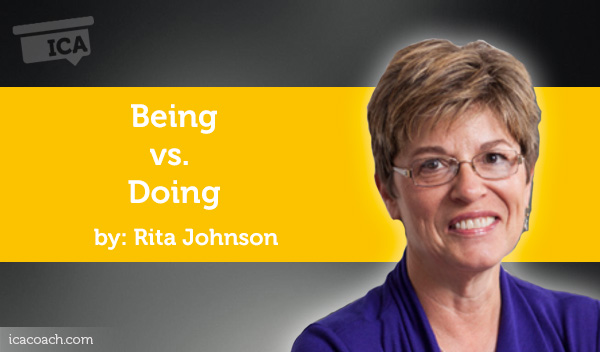
A Coaching Power Tool Created by Rita Johnson
(Life Coach, UNITED STATES)
Spending lots of hours at work, engaged in something all the time, having lots of tasks on her to do list as well as “53 projects ongoing” is something that my client pointed to with pride. And I was aghast!
In my 30 years of corporate work including 15 years of coaching, I know that no one completes 53 projects well or completely and rarely on time. Because in the frenetic acts of doing, there is no time for being.
Doing something all of the time – busyness – creates a false sense of self-worth (they need me) and can become a chronic issue of never truly being present for ourselves or with others.
Chronic busyness can lay the foundation for health issues as well as inner stress and turmoil – something that busy people can’t afford!
Doing
has been defined as “the activities in which a particular person engages” and “effort, activity”. Some synonyms are: performance, carrying out, execution, implementation, achievement, accomplishment, realization, completion and effort, exertion, work, hard work, application, labor, toil, struggle.
So while demonstrating performance, execution, implementation and accomplishment are all characteristics and behaviors of successful clients, these same clients can exert significant effort, work hard and even labor, toil and struggle in the name of success.
Being
has been defined as “existence” and “the nature of a person”. Some synonyms are: living, life, reality, actuality and soul, spirit, nature, essence, inner being, inner self, psyche.
Being can also be reflected in mindfulness, engaging fully with people and the moment. In that state of being it is much easier to focus, truly listen and create ideas and strategies that will in truth provide more positive, longer lasting impact then when we are rushing around exerting effort in doing.
Kevin Cashman, in his book The Pause Principle: Step Back to Lead Forward, says,
Our addiction to action, our busy-ness, our preoccupation with incessant distractions and pursuit of the ubiquitous “more” in our 24/7, constantly connected, globally caffeinated culture conspire to diminish rather than strengthen our leadership capacities.” He goes on to say, “Pause is a universal principle inherent in living, creative systems …In physics, it is the second Law of Thermodynamics: As activity lessens, order increases.
In their book, The Power of Full Engagement, authors Jim Loehr and Tony Schwartz talk about
managing energy, not time, as the key to high performance and personal renewal
and their examples and body of evidence comes from direct work with sports athletes – on the field and the court – as well as those they refer to as ‘corporate athletes’.
All of these authors suggest and support the notion that we must in fact, pause and reflect every day in order to be our very best – to be top notch at whatever we choose to do.
Because it is in the pause, the act of being, that we are able to fully listen to our bodies, reflect on our choices and decisions, still the ‘monkey brain’ that is constantly clamouring for attention, and breathe. This provides an opportunity to more clearly recognize what is coming next, what we need to be prepared for and what we need to do, as well as reflect on decisions, actions and conversations that we’ve had. It helps us to discern our purpose.
There is nothing inherently wrong in busyness, in doing. It is the nature of how we choose to be busy that can be less productive and ultimately, less fulfilling, than working a ‘being’ moment or two into the day.
Learning to manage our energy effectively has far greater impact physically and emotionally than managing our calendars, our time. It is the balance between expending energy and renewing energy that determines the success.
I had a client who was constantly on the go – hard charging and expecting the same of others, and had been very successful up to this point in his career. In order to move to the next level of senior management, he was being asked to reassess his approach and frankly, his wife was asking him similar questions.
After several coaching sessions, I asked him when he did his reflecting time. He said “what do you mean?” Well, “when do you reflect upon the day; decisions made, conversations you’ve had, planning for tomorrow?”
Turns out, he’d never done any reflecting to the best of his recollection. He had a 30 – 45 minute commute home every night and he decided to use that time to reflect on his day and how he showed up as a leader.
Within 2 months he had made so many significant changes that his wife asked him what was wrong! His direct reports were more open to him and his suggestions, and even ventured to share their own ideas in ways they hadn’t before. He really began to show up as a leader that others wanted to follow.
To help your client think about the value of Being vs Doing, here are some ways to create that ‘pause’:
Take a deep breath, hold it for 4 seconds and then release, forcing all of the air from your lungs. Do this 2-3 times and notice where in your body you feel relaxed, what feels good?
Now ask yourself some of these questions:
- What happened today that I am most proud of?
- What happened today that I wish had gone differently?
- What conversation or discussion went extremely well?
- If I could repeat today, what are the things that would be at the top of my list?
- With whom did I show up best today?
- Was there something that I planned to do but didn’t?
- What do I want to do tomorrow to show up even better than today?